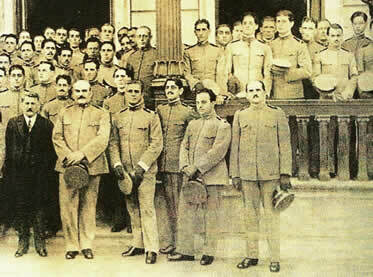The German surrender and the signing of the Treaty of the “Fourteen Points for Peace” did not definitively seal the open issues with the conflict of the First World War. Some powers still sought a more rigorous treatment of the nations defeated in the war, mainly Germany. Therefore, on June 28, 1919, the main victorious nations of the conflict met at the Palace of Versailles, in Paris, for new peace negotiations.
Worried about the possibility of another tiring war, the United States pleaded for the creation of the League of Nations. This body would have an international character and should judge military tensions in the international sphere. On the other hand, France and England wanted to protect their economic interests at the expense of the defeated peoples. The British demanded control over German colonies and sea routes. France, on the other hand, pleaded for the reconquest of the Alsace-Lorraine region and the payment of indemnity by Germany.
After the negotiations, the Treaty of Versailles provided for the benefits and punishments to each of the sides involved in the war. Poland was placed as an independent state and freed from previous Russian domination. France managed to regain the Alsace-Lorraine region. The German colonies in Africa were divided between English, Belgian, French. The German colonies in the Pacific were handed over to Japan and England.
In addition to territorial losses, Germany, considered the main culprit for the war, was forced to reduce its armies, extinguish its navy and was prevented from producing any kind of material warlike. Finalizing the severity of the punishments against Germany, the treaty also provided for an indemnity of 132 billion gold marks to the victorious nations. Such money would be used for the recovery of public and private assets, and the payment of pensions to war victims.
That same year, the Treaty of Saint-German redrawn the political-territorial map of Europe. The Austro-Hungarian empire was dismembered into new nations. Austria lost its maritime outlets and was forced to recognize the independence of Yugoslavia, Hungary, Czechoslovakia and Poland. The Turkish-Ottoman Empire signed the Treaties of Sèvres and Lausanne, which provided for the loss of territories in Mesopotamia and Palestine to England, and French domination over Syria and Lebanon.
The signed treaties, contrary to what they claimed to defend, did not ensure peace and balance between European nations. According to several historians, the heavy punishments imposed on Germany prepared the whole climate of hatred and revenge that fueled the preparations for World War II. With the rise of the totalitarian Italian-German regimes and the economic crisis of 1929, political and economic rivalries would be resurrected in Europe.
Do not stop now... There's more after the advertising ;)
20th century - wars - Brazil School
Would you like to reference this text in a school or academic work? Look:
SOUSA, Rainer Gonçalves. "The post-First World War treaties"; Brazil School. Available in: https://brasilescola.uol.com.br/guerras/os-tratados-do-pos-primeira-guerra.htm. Accessed on July 27, 2021.


